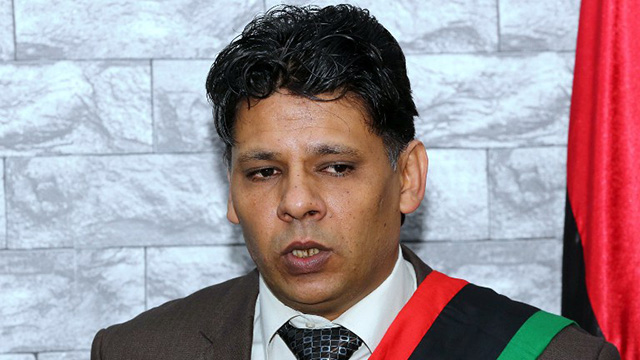SUMMARY
This is AI generated summarization, which may have errors. For context, always refer to the full article.

TRIPOLI, Libya – A Libyan court indicted Thursday, October 24 around 30 Moammar Gaddafi aides, including the slain dictator’s son Seif al-Islam, for a raft of alleged offences during the 2011 revolt, prosecutors said.
The indictments clear the way for what will be the most high-profile trial in the country’s history, with defendants also including former intelligence chief Abdullah al-Senussi and Kadhafi’s last prime minister, Baghdadi al-Mahmudi.
Gaddafi himself was captured and killed by rebels outside his hometown of Sirte after an 8-month revolt against his 4-decade rule backed by NATO air strikes.
“The court ordered they stand trial on the main charges against them dealing with the repression of the 2011 revolt,” prosecutors’ office spokesman Seddik al-Sour said after the hearing.
“The trial date will be set by the Tripoli criminal court,” Sour told a press conference.
The charges pressed against the defendants include murder, kidnapping, complicity in incitement to rape, plunder, sabotage, embezzlement of public funds and acts harmful to national unity.
Only a dozen of the accused appeared in court, said a lawyer who was present at the hearing, held under tight security at a Tripoli court and prison building.
Sour said the law did not require that the defendants all be in court to hear the indictment.
The fact that “some of the defendants would have needed exceptional security measures to appear prompted the court to decide to notify them of its decision after the hearing.”
“But the presence of all the accused will be obligatory at the trial hearings before the criminal court,” Sour said.
At a pre-trial hearing in September, lawyers already pleaded not guilty to all the accusations levelled by the prosecution.
The court had the authority to accept the charges sought by prosecutors, dismiss them or ask for more evidence.
It examined some 40,000 documents and 4,000 pages of interrogation transcripts in a process lasting several weeks.
Seif al-Islam did not appear at any of the 3 pre-trial hearings.
He is in the custody of a former rebel militia in the hill town of Zintan, southwest of the capital, where he was taken after his capture in November 2011.
Judges have ordered his transfer to Tripoli, so far without success, in a symptom of the limited authority of the post-Gaddafi central government two years after the dictator’s overthrow.
Seif al-Islam is still wanted for trial by the International Criminal Court in The Hague on charges of war crimes and crimes against humanity connected with the uprising.
The ICC had also originally sought to try Senussi but ruled on October 11 that the former spy chief, now 63, should be tried by Libya, the first time it has deferred a case to a national judiciary.
Senussi’s lawyers have appealed against that ruling, arguing that Libya is “unable and unwilling genuinely to conduct fair proceedings” against him.
“He has been detained in Libya for nearly 13 months without access to any lawyer despite his repeated requests to see a lawyer… he is cut off from the world and has been denied family visits and telephone calls,” lawyer Ben Emmerson said in a letter to the court released last week.
But the Libyan prosecutors’ spokesman dismissed such concerns on Thursday.
“Libya’s justice system has shown that it is capable of holding fair trials,” he said.
Senussi also stands accused of ordering the massacre of hundreds of political prisoners in Abu Selim jail in 1996.
Relatives of those killed demonstrated outside the court building again on Thursday holding up pictures of their dead loved ones and demanding that Senussi face the death penalty.
But Sour said that case would be the subject of a separate trial. – Rappler.com
Add a comment
How does this make you feel?
There are no comments yet. Add your comment to start the conversation.